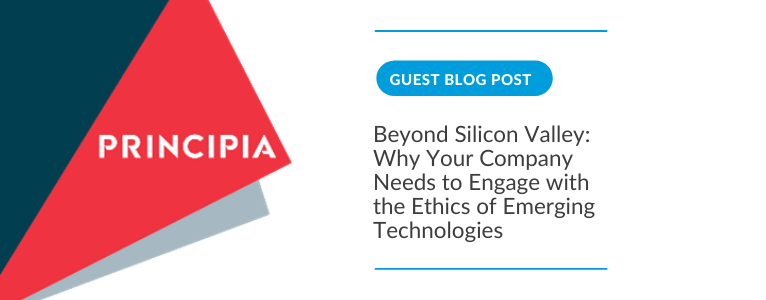
Guest blog post by Marco Meyer, Director, Principia
Emerging technologies such as artificial intelligence, robotics, and the blockchain transform the way we do business, live our lives, and organize society. This brings great opportunities, but also generates risks of harm – to people, society, and the environment.
Organizations no longer compete only in the race for digital transformation, but also for the trust of society. Where customers and clients put their trust will increasingly depend on the ability of organizations to align their use of emerging technology around one core question: How do we deliver a positive impact for society?
Earning that trust is no longer only a concern for Silicon Valley companies. Banks and financial institutions are adopting blockchain-based systems, traditional retail companies are implementing sophisticated AI solutions, and governments are automating services provided to citizens. This expansion turns emerging technology ethics into a concern across industries and jurisdictions. Expectations to use emerging technology responsibly are rising. Indeed, major transnational organizations like the EU are adopting policy frameworks for responsible technology right now.
In this environment of rising expectations, organizations need to understand the ethical challenges of emerging technologies and build them into products and services so that they can be trusted. Organizations ignore ethics at their peril: As the decline in major tech companies indicates, organizations that fail to anticipate negative effects of emerging technologies of privacy, safety, or political discourse can cause harm and lose the trust of customers and regulators.
At Principia, we help organizations build the capacity for integrating responsibility into every aspect of dealing with new technologies. Ethics is not an exercise in public relations. Instead, it requires the capacity for ethical foresight, for finding a hidden consensus amongst stakeholders about new ethical tradeoffs, and the ability to translate ethics into tools and frameworks that guide the responsible use of emerging technologies day-to-day.
That’s why we partnered with Logical Operations to develop the Certified Ethical Emerging Technologist (CEET) training. This course equips technology leaders with the tools to identify and manage common ethical risks. By following the course's practical, problems-based approach, leaders become adept at applying theories, principles, frameworks, and techniques in their own roles and organizations.
Marco Meyer is a Director at Principia. Marco specializes in organizational ethics, organizational psychology, and quantitative analytics, with a focus on the financial sector. Marco teaches and researches on topics at the intersection of ethics and economics, with a focus on how concepts from moral philosophy apply to organizations operating in a competitive environment. Marco holds a PhD in Philosophy from the University of Cambridge and a PhD in Economics from the University of Groningen.
Wessel Reijers is a Senior Associate at Principia. Wessel specializes in philosophy and ethics of technology and responsible innovation, with a focus on blockchain and regulatory technologies. Wessel teaches and researches on themes that link normative ethics with the practical realities of development of emerging technologies. Wessel holds a PhD in Ethics of Technology from Dublin City University.


